If your normally sweet, docile little hen just turned into a fire-breathing dragon with feathers, you might have a broody hen. Perhaps you are wondering if she is sick, or injured, or ate something that didn’t agree with her crop?
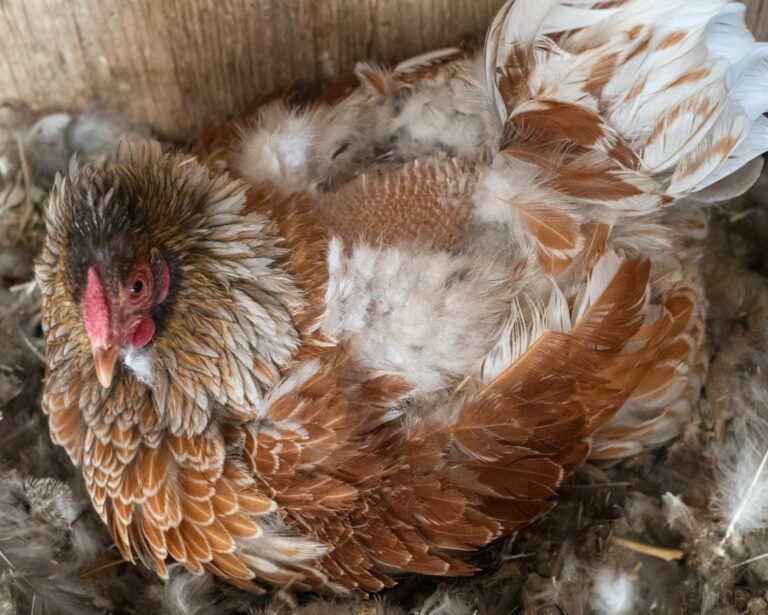
If your hen just underwent a major personality change, it’s likely she’s broody. You may have a lot of questions about what a broody hen is, how do you care for her, and why is she acting like that?
Keep reading for (just about) everything you could ever need to know about broody hens including what’s happening, what her needs are, and how you can help her or stop her from being so broody.
What Is a Broody Hen?
A broody hen is a chicken with baby fever. You know, that insatiable desire to have a baby that gets worse the older you get. Chickens get the same way. A broody hen is a hen that wants to raise chicks.
Generally, it happens in the spring when the days begin to lengthen and when a hen begins to mature.
These changes signal a hen’s body to release prolactin, the hormone responsible for the mothering instinct in chickens. She’s undergone a hormonal shift that tells her to get ready to sit on her clutch of eggs.
Chickens will often lay their eggs in a communal spot, like a nest box, and when the hen going broody thinks there are enough, she’ll sit on them.
They may be all hers or they may belong to some other hen. When she’s good and ready, she’ll sit on those eggs until they hatch. Some broody hens will continue to steal other eggs within reach all throughout her broody period.
Remember, if you don’t have a rooster, your broody’s eggs won’t develop into chicks. So don’t allow a hen to remain broody if she can’t raise any chicks, it isn’t good for her. It’s the hatching of the eggs that signals her to stop brooding them and start tending to her babies.
For the next four to six weeks and even longer, that mama hen will tend to and protect her babies. She’ll teach them to eat, drink, scratch, and keep them warm at night.
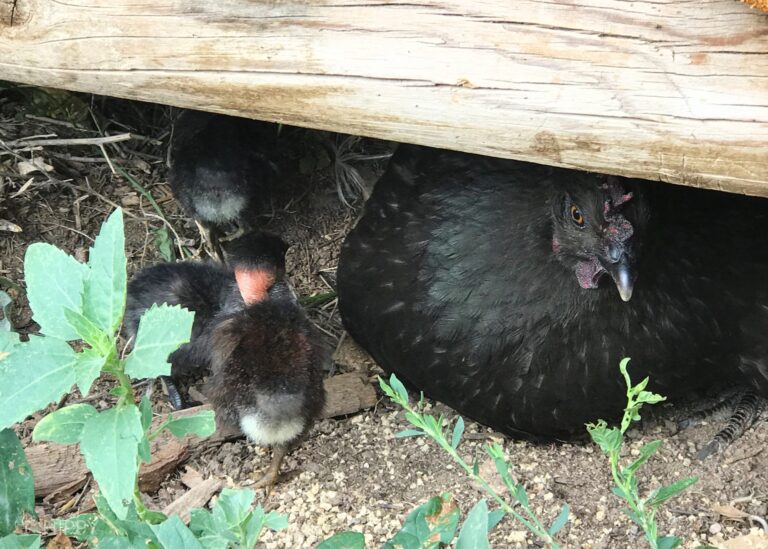
Why We Love Broodies
What’s so great about broody hens? They are dedicated to their eggs. Rain or shine, they will sit on their eggs and keep them safe.
Usually, the hen doesn’t care what eggs she sits on. Chickens have been known to hatch all kind of eggs – from other breeds of chicken, to duck, to quail.
They aren’t picky, they want to have babies! If your timing is just right, you can order any breed of hatching egg and sneak them under your broody hen.
She’ll hatch and raise them for you and you won’t have to incubate them at all. You won’t need to brood them in a brooder box or keep them warm, because the =momma hen will take care of them.
Bantams that have a tendency to go broody can sit on and hatch larger eggs, they just can’t hatch very many at a time.
One great reason to hatch eggs under a broody is that after they are hatched, the mama hen will raise them, keep them safe, warm, and teach them everything they need to know to be a chicken.
Chicks raised under a broody are less likely to have problems such as pasty butt and more likely to acclimate to weather easily.
The mama hen will protect the babies from the rest of the flock until they are old enough to handle it on their own.
This means you won’t need to worry about integrating new chicks or chickens to your existing flock later on. Broody hens can be a big help on your homestead.
What Breeds Make Good Broodies?
Some hens are great layers, like leghorns. Other breeds make better broodies. Silkie chickens, for example, are known for their propensity to turn broody.
This is great if you want to hatch a lot of eggs, but not so great if you want to eat a lot of them! Some great broody breeds include:
What Breeds Don’t Go Broody?
Some breeds of chicken have had that broodiness bred out of them. When a hen goes broody, she stops laying eggs and sits instead.
Over time, breeders that bred chickens for egg production rather than reproduction removed the broody hens from their lines, leaving behind breeds of chickens that don’t really have an instinct to hatch eggs, or that rarely try to hatch eggs. These include:
- Leghorns
- Plymouth Rock
- Rhode Island Reds
- Hamburgs
- Sebrights
- Polish
Of course, there are variations within any breed and always exceptions to the rule.
A breed that doesn’t typically go broody can still include hens that have an instinct to sit on eggs, and occasionally breeds that seem to always get broody can have hens that have no interest in sitting on eggs.
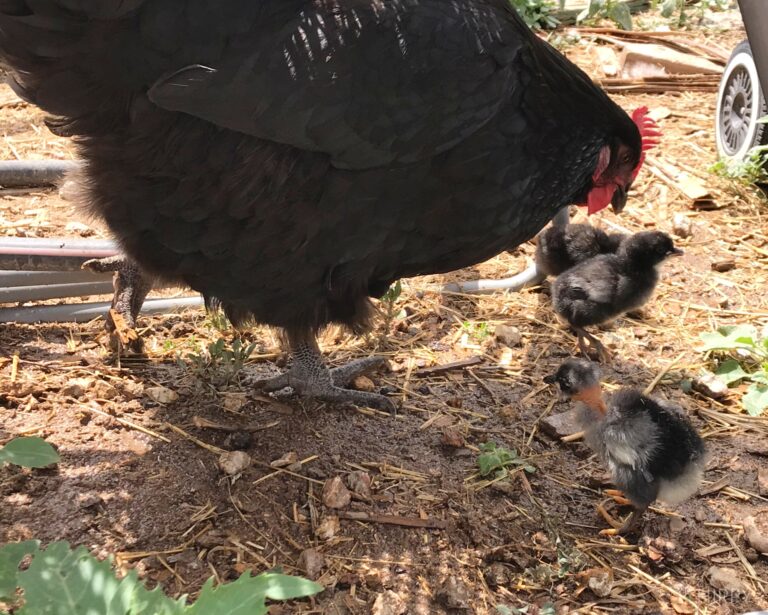
What Are the Signs You Have a Broody Hen?
- Personality Changes. One obvious sign of a broody hen is her personality change. She may normally be quite docile, but when she turns broody, she’ll have a strong desire to protect her eggs and chicks.
- Stays on the nest all day and night. She won’t leave the nest often, like the other hens. She’ll want to sit on her nest all the time, with only brief breaks for food and water.
- She may peck or bite. As part of her protective instinct, she may peck or bite at your or any other person or animal that gets too close.
- She puffs up when she sees other people or animals. This lets you know to beware!
- She may become territorial over the nest box. She may not want to share the space where her eggs are laid.
- She squawks or growls. Instead of her typical bawk-bawk sound, your broody hen may squawk and growl anytime you are near.
- She may have bald spots on her breast. Some hens will pluck out their own breast feathers in order to pass more body heat to the eggs.
- She has broody chicken poop. Broody hens typically only defecate when they leave the nest box, so their poo can be alarmingly large and foul smelling. This is normal, no matter how startling it may be.
How Do Broody Hens Act?
Broody hens may undergo a quick personality change when those hormones kick in. She flips from the sweet docile hen you could pick up and pet to something more akin to a mother bear.
She may stay on her nest all day and night, although broody hens usually get up once in the morning and sometimes once in the evening to eat, drink, and poop.
My broody hens often will get up at night to eat – after the other chickens are already roosting for the night – and grab a quick bite to eat and a drink before anyone can notice she’s even bone.
Problems with Broodies
- She may kill other chicks. Sometimes, broody hens think another hen’s chicks are a threat to her own or her eggs. She may kill the chicks if they come within pecking reach. I’ve had it happen, and it is always sad. If you see this begin to happen, you may want to remove the remaining chicks and raise them in a brooder box.
- She may try to sit on too many eggs. A hen can only sit on as many eggs as her body can cover. If she is a small hen, this isn’t very many! If she tries to sit on too many, the outer eggs won’t stay warm enough to hatch. If she moves them around often, all of the eggs will get too cold at some point in the process to hatch. The best way to solve this is to mark her eggs and remove any additional eggs daily.
- Other chickens may add eggs to the broody nest. Similarly, other hens may lay their eggs in the broody’s nest, so that even if she didn’t start out with too many eggs, she may end up with too many.
- She may sit too long if the eggs don’t hatch. If there aren’t any viable eggs, your broody may sit too long. This may make her malnourished and dehydrated if she isn’t getting up often enough to eat and drink. You may need to break her broodiness if it lasts too long.
- She may give up and abandon the nest. Maybe it is called broody for a reason, because sometimes a hen will give up her nest for unknown reasons. She may be a very good broody, until one day decides she has had enough and just takes off. If you are partial to the eggs in the broody’s nest, keep an incubator on standby. It is normal for the eggs to get cooled now and then since the broody does leave her nest to eat and drink, so you’ll probably be fine moving your eggs to an incubator.
How Long Does a Hen Go Broody?
A hen will go broody for as long as it takes to hatch the eggs, which is about 21 days. However, if a hen is sitting on eggs that aren’t fertilized, she will continue sitting and sitting because there aren’t any chicks hatching to signal her to stop.
Some hens will lose weight when they are broody because they don’t get off the nest often to eat. You’ll need to take special care when the broody hen’s eggs don’t hatch, and you may want to consider breaking her from being broody.
What Happens when the Eggs Hatch?
When the eggs begin to hatch, the momma hen will continue sitting on her eggs for several days. Baby chicks can go for three days without eating or drinking because they are still absorbing their yolk.
They will likely stay with their mother hen until the other eggs have hatched. You may notice the mother hen has thrown dud eggs and dead chicks out of the nest.
Once the eggs have hatched, she will take her babies for food and water and then gather them under her when they are chilly. She may continue to puff up and growl in defense of her chicks after they have hatched.
Reasons You May Not Want a Broody Hen in Your Flock
- Less eggs. A broody hen doesn’t lay eggs. So for the three weeks she is sitting on her eggs and probably a few more weeks after that, she won’t be giving you any to eat. If you don’t want to give up any eggs, you won’t want a broody.
- Squabbling for next boxes. Hens generally like to share nest boxes, but a broody doesn’t want anyone else coming in to lay eggs while she is sitting on hers. If another hen tries to share her nestbox, a squabble may happen, resulting in grumpy chickens and broken eggs.
- Problems with pecking order. A broody hen may disrupt the natural pecking order in the flock by her personality changes. And she may need to be reintroduced to the flock once her chicks have hatched.
- You don’t want chicks. If you don’t want any chicks, you surely don’t want to keep a broody hen around.
- You don’t have a rooster. If you don’t have a rooster, those eggs sitting under your broody hen aren’t going to hatch.
How Do You Break a Broody Hen?
If you don’t want a broody hen, you’re going to have to break her. Breaking a broody hen means helping her come out of her mothering instinct so that she starts laying eggs and stops sitting on them. You might be able to prevent a hen from being broody by taking away her eggs every day, although this may not always work.
Justin Rhodes gives a great tutorial for breaking broody hens in his video: .
He puts his broody hens in a large crate with food, water, and no eggs or bedding. He says using this method, they should be broken in three days or less. Justin also says that you can check if your hens are broody by reaching towards them. If they puff up, they are still broody!
Another way to break a broody hen is to put her in a cage with a wire floor in a room with bright lights. This combination seems to squelch their mothering instinct.
After you’ve broken your broody, you’ll have to reintroduce her to your flock, and the pecking order may have changed. Wait until all of the chickens are asleep for the night, and then slip quietly into the coop in the dark.
She’ll be more quickly accepted back into the flock. Keep an eye on her, if she goes right back to the nest box, she’s probably not broken of her broodiness and will need to be broken again.
If your broody won’t break, you could try giving her a few chicks to sit on. Start with plastic eggs or fake eggs, if she isn’t sitting on real eggs already.
After she has been setting on eggs for a while, then you can slip some chicks underneath her and remove the eggs. It’s best to do this in the middle of the night when she is sound asleep. Wear gloves and long sleeves to protect yourself from a peck or bite!
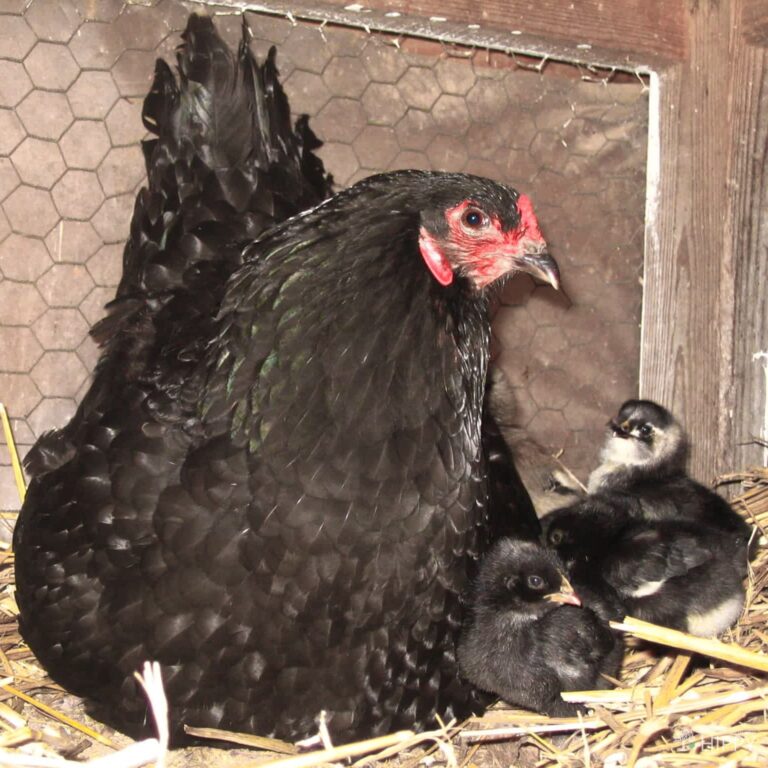
Should You Separate a Broody Hen?
Some people like to separate their broody hens from the rest of the flock. There certainly are advantages. For example, the hen and the eggs will be more protected from other members of the flock. Squabbling can break out over nest boxes, so the broody’s eggs could end up broken.
Also, broody hens are more at risk for infestations of lice or fleas because they don’t move around as often and don’t take dust baths. One broody mom may kill another broody’s chicks as they hatch because she sees them as a threat to her own babies.
Also, you may want your broody to be in a location that has more convenient access to food and water. However, moving a broody hen and her eggs may cause her to abandon her eggs.
You will also have the difficulty of reintroducing her and her babies to the rest of the flock. Where will you keep them until they are big enough to fend for themselves? Whether or not you should separate your broody is really a matter of personal preference based on what is more convenient for your and better for your hens.
If you do move your broody, your best chances are to move her at night in the dark. Don’t turn on any lights but try to carefully move her and her eggs so that she is disturbed as little as possible. There is always a risk, but it may be necessary, especially if she were to nest outside of the coop.
Can You Convince a Hen to Go Broody?
You cannot force a hen to go broody and sit on eggs for you. However, you may be able to convince her to go broody.
- Leave eggs in the nest box. If you want to convince a hen to go broody, make sure to leave her eggs in her nest box. A hen will have some unique idea of how many eggs she needs to form her clutch. When she hits her ‘magic number,’ so to speak, she’ll start sitting. Leave some extra eggs in her nest to entice her to sit on them.
- Give her a homey spot. A hen needs to feel warm and safe in a dark area in order to comfortable sit on her eggs. You might be able to convince her to set eggs for you by giving her a safe, warm environment that is dark and cozy for a chicken.
Tricks to Ensure a Better Hatch from Your Broody
Your broody will do a lot of the hard work of hatching and raising chicks for you. But there are a few things you can do to help matters along.
- Mark the eggs. A broody may continue to collect eggs throughout her broody cycle. And she may kick out some less than appealing eggs, as well. Mark the eggs she is setting on with a date that she started sitting, and an approximate hatch date. This way, you’ll know which eggs to leave under your hen and which eggs you can gather up for breakfast.
- Remove the duds. You don’t need any non-viable eggs stinking up the place or attracting flies. Carefully remove any eggs that aren’t developing.
- Candle the eggs. There is no use leaving your hen to sit on eggs that aren’t going to hatch. Candle them around days 10 and 18. Any sooner than that, and you might not be able to see the developing embryo. Day 19 marks ‘lockdown’ day – the day the hen stops getting off her nest until the chicks begin to hatch. Candle your eggs and remove any that have died or didn’t develop.
- Keep food and water handy. Your broody won’t be leaving her nest often to get food and water. Keeping it close by will help her to eat and drink more, thus staying healthier for the duration. It will also help the babies if you have it close by when they are ready to eat and drink.
There are many things that can go wrong when you have a broody hen. However, there are many things that can go right, giving you and your family an enjoyable experience as you watch chicks hatch and grow.
I’ve seen a few heartaches from crushed eggs and dying babies, and it is always sad. I’ve had as many as five silkies go broody together, raise their babies together, and share mothering duties.
I’ve seen roosters guard the baby chicks and show them where the food is, and even gathering them underneath themselves to keep the babies warm.
Right now, I’ve got a momma hen caring for 15 chicks, keeping them warm night after night, while another broody sits in the coop right above her.
Whether or not you want to have a broody hen in your coop is a personal preference, but I love having baby chickens around the farm. So if my hens go broody, I’ll be thankful for the babies that are on their way and hopeful for a return to egg production soon.
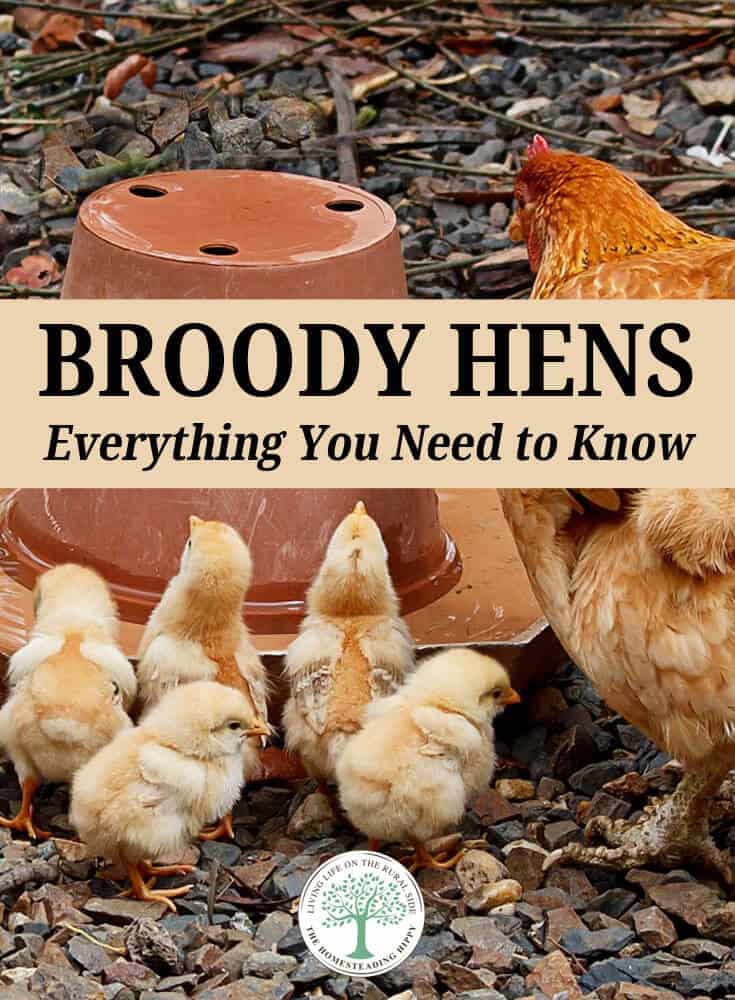

Amanda is a homesteader and a Jesus-loving, mother of 6 toddlers. She’s raising lots of fancy chickens and goats on her small homestead (among other things). Find out more about the team here.

Nice article. I have one hen that, despite being a breed on the doesn’t-go-broody list, went broody last year and again this year. She was less tyrannical this year. Both times, we removed her and her eggs from the main coop, as the nest boxes were too high off the ground for baby chicks to navigate, as well as the nest boxes were too much in demand by the rest of the hens to take one out of action.
Giving the broody hen a separate nest box on the ground in a fenced enclosure gave the rest of the flock a break as well as keeping the chicks safe. It worked great again this year. This separation also prevented the other hens from adding to her nest after the 21-day clock had started.
Some say that broodiness can be “contagious.” This year, I had a second hen (same non-broody breed) start going broody too. We had no fertile eggs for her, so we had to break her of it. We got to her early, so she didn’t fight it for long.
I’m looking forward to next spring/summer to see if they both go broody again. Hens incubating and raising chicks is a lot less fussy as a way to raise replacement stock.
Thanks again,
— Mic
My hen started to sit at 10 months hatched some eggs at a year old when the chicks were 2 months she was mean to them and did not want them any more. 2 months later she is sitting again I did lock her separate for close to a week and she seemed ok but that did not work Is it normal for a hen to sit twice in year